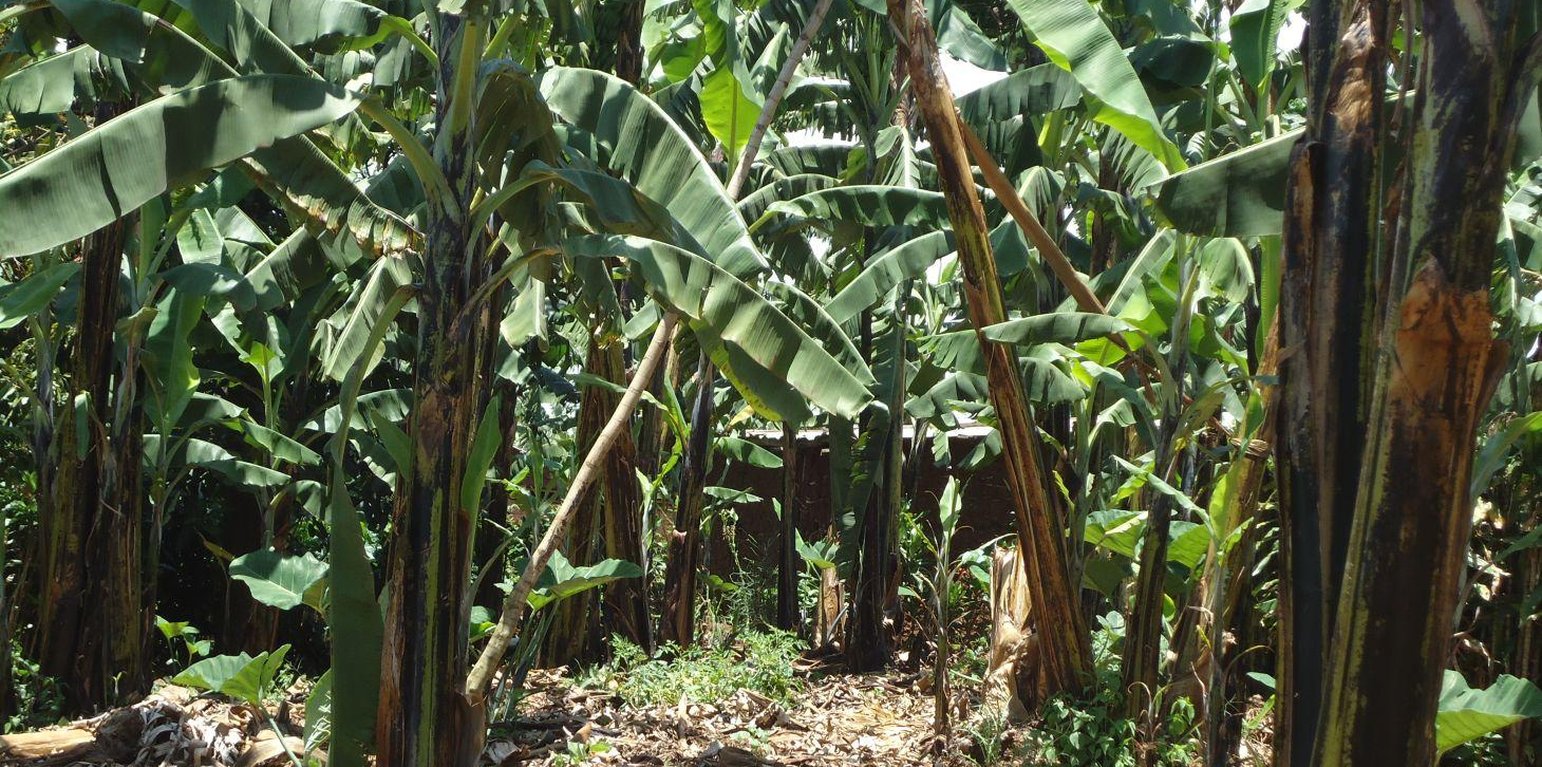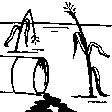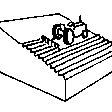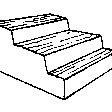Banana manure pits and mulching
(ប្រទេសរវ៉ាន់ដា)
Gusasira no gutera urutoki mu myobo irimo ifumbire mborera
ការពណ៌នា
Banana planted in a regularly spaced manured pits and in combination with grass and banana mulch application to enhance soil fertility and moisture and improve crop production.
Banana is planted in a manure pit and the soil surface is carefully covered by banana or grass mulch. The manured pit is 0.6m deep and 2.0-2.0m wide. During establishment activities pits are filled with a mixture of soil and organic manure. Attention should be made when adding the mixed soil to the pits as a radius of 20 cm starting from the center of the pit where the banana is planted must not be filled with the mixture but filled merely with soil.This will assure that banana roots grow deeper in search for the nutrients. Recommended parallel and perpendicular spacing between the banana planting pits is 5m.
Purpose of the Technology: Banana manured pits and mulch application is a combination of an agronomic and structural technique. This method allows nutrients to be concentrated around the roots zone and keeps longer the available soil water content and controls the soil erosion.
Establishment / maintenance activities and inputs: The banana manure pits and mulching provides easy crop management options. The high demand of water and nutrients by banana can be easily met to maximize the fruiting potential. To achieve this potential, farmers are required to maintain a minimum of 3 plants per pit, one mature (grand) banana plant fruiting, a second half grown (mother), and one sucker (child) growing in the same pit. Every four months a farmer is expected to harvest a bunch of banana of around 80 kg per pit.
Natural / human environment: The constituted layer of mulch prevents rainwater from eroding the top soil, improves soil organic carbon, provides shade to plant roots, and most importantly keeps longer soil moisture in dry seasons.
ទីតាំង
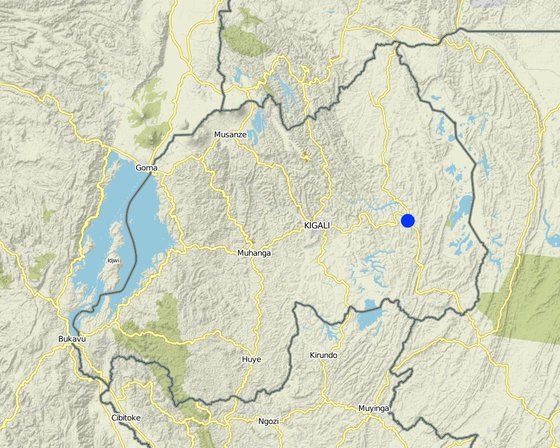
ទីតាំង: Kirehe District (Eastern province), Rwanda, ប្រទេសរវ៉ាន់ដា
ចំនួនទីកន្លែងបច្ចេកទេស ដែលវិភាគ:
ចំណុចយោងភូមិសាស្ត្រនៃទីតាំងជ្រើសរើស
ការសាយភាយនៃបច្ចេកទេស: ត្រូវបានផ្សព្វផ្សាយត្រឹមតំបន់មួយ (approx. 10-100 គម2)
តើស្ថិតក្នុងតំបន់ការពារអចិន្ត្រៃយ៍?:
កាលបរិច្ឆេទនៃការអនុវត្ត: 10-50 ឆ្នាំ
ប្រភេទនៃការណែនាំឱ្យអនុវត្តន៍៖
-
តាមរយៈការបង្កើតថ្មីរបស់អ្នកប្រើប្រាស់ដី
-
ជាផ្នែកនៃប្រព័ន្ធប្រពៃណី (> 50 ឆ្នាំ)
-
ពេលកំពុងពិសោធន៍
-
តាមរយៈគម្រោង / អន្តរាគមន៍ពីខាងក្រៅ
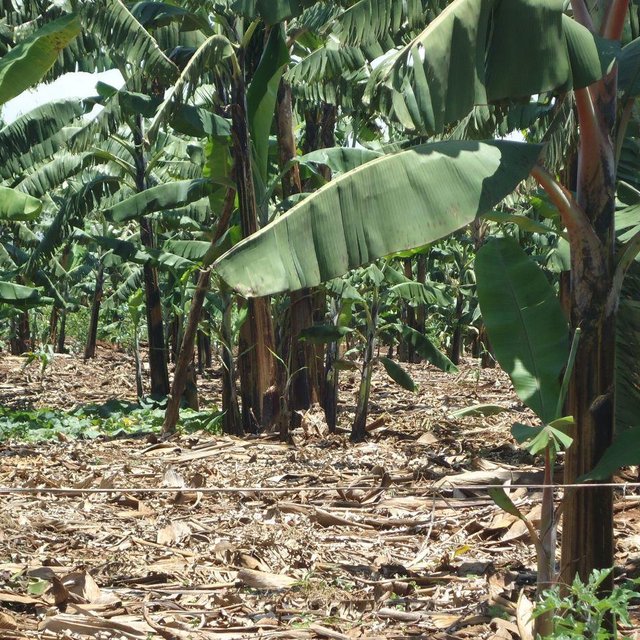
5m spacing beween banana plants (Ngenzi Guy (RAB/South))
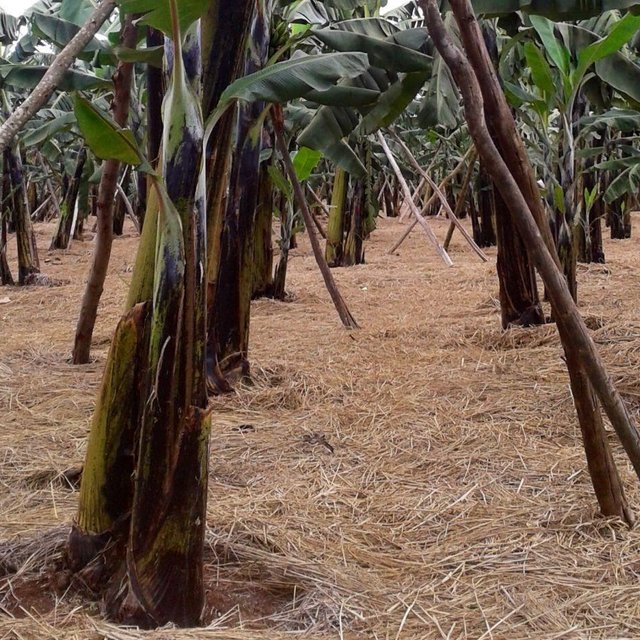
Applying mulching in banana plantation (Ngenzi Guy)
គោលបំណងចម្បងៗ
-
ធ្វើឱ្យប្រសើរឡើងនូវផលិតកម្ម
-
កាត់បន្ថយ, បង្ការ, ស្តារឡើងវិញនូវការធ្លាក់ចុះគុណភាពដី
-
អភិរក្សប្រព័ន្ធអេកូឡូស៊ី
-
ការពារតំបន់ទីជម្រាល/តំបន់ខ្សែទឹកខាងក្រោមបញ្ចូលជាមួយបច្ចេកទេសផ្សេងទៀត
-
អភិរក្ស/ធ្វើឱ្យប្រសើរឡើងជីវចម្រុះ
-
កាត់បន្ថយហានិភ័យនៃគ្រោះមហន្តរាយ
-
បន្ស៊ាំទៅនឹងការប្រែប្រួលអាកាសធាតុ/គ្រោះមហន្តរាយ និងផលប៉ះពាល់របស់វា
-
កាត់បន្ថយការប្រែប្រួលអាកាសធាតុ និងផលប៉ះពាល់របស់វា
-
បង្កើតផលប្រយោជន៍សេដ្ឋកិច្ច
-
បង្កើតផលប្រយោជន៍សង្គម
ការប្រើប្រាស់ដី
-
ដីដាំដំណាំ
- ដំណាំរយៈពេលវែង (មិនមែនឈើ): ចេក/plantain/abaca
ចំនួនសារដែលដាំដំណាំក្នុងមួយឆ្នាំ: 2
ការផ្គត់ផ្គង់ទឹក
-
ទឹកភ្លៀង
-
ទឹកភ្លៀង និងប្រព័ន្ធស្រោចស្រព
-
ប្រព័ន្ធស្រោចស្រពទាំងស្រុង
គោលបំណងទាក់ទងនឹងការធ្លាក់ចុះគុណភាពដី
-
ការការពារការធ្លាក់ចុះគុណភាពដី
-
ការកាត់បន្ថយការធ្លាក់ចុះគុណភាពដី
-
ការជួសជុល/ ស្តារឡើងវិញនៃឱនភាពដីធ្ងន់ធ្ងរ
-
ការបន្ស៊ាំទៅនឹងការធ្លាក់ចុះគុណភាពដី
-
ដែលមិនអាចអនុវត្តបាន
ប្រភេទនៃការធ្លាក់ចុះគុណភាពដីដែលបានដោះស្រាយ
-
ការហូរច្រោះដីដោយសារទឹក - Wt: ការបាត់ដីស្រទាប់លើដោយការហូរច្រោះ
-
ការធ្លាក់ចុះសារធាតុគីមីក្នុងដី - Cn: ការថយចុះជីជាតិ និងកាត់បន្ថយបរិមាណសារធាតុសរីរាង្គ (មិនកើតឡើងដោយការហូរច្រោះទេ)
ក្រុម SLM
-
ធ្វើឱ្យប្រសើរឡើងគម្របដី/ ដំណាំគម្របដី
-
ការគ្រប់គ្រងជីជាតិដីតាមបែបចម្រុះ
វិធានការ SLM
-
វិធានការក្សេត្រសាស្ត្រ - A1: ដំណាំ/គម្របដី
-
វិធានការរចនាស័ម្ពន្ធ - S4: កម្រិតភ្លឺ រណ្តៅ
គំនូរបច្ចេកទេស
លក្ខណៈបច្ចេកទេស
This technology consists of a pit of 0.6x2x2m respectively, for depth, length and width. Banana is planted in center of each pit in which organic manure from different sources is added and mixed with the soil. The spacing along the row and between rows is 5 m. The top soil is taken back and only 15-30 kg of organic manure are added and mixed with soil. Attention should be made when adding the mixed soil to the pits as a radius of 20 cm starting from the center of the pit where the banana is planted must not be filled with the mixture but filled merely with soil.
Location: Kayonza. Kayonza/South/Rwanda
Date: 2013
Technical knowledge required for field staff / advisors: moderate
Technical knowledge required for land users: low
Main technical functions: increase in organic matter, increase in nutrient availability (supply, recycling,…), increase of infiltration, increase / maintain water stored in soil, water harvesting / increase water supply
Secondary technical functions: control of raindrop splash, improvement of ground cover, improvement of topsoil structure (compaction), increase of groundwater level / recharge of groundwater, increase of biomass (quantity)
Mulching
Material/ species: grasses, crop residues and strow of banana
Quantity/ density: 50,000 m3
Remarks: in bananas field the thickness of mulch is about 5 cm, which including a total quantity of 50,000 m3
Manure / compost / residues
Material/ species: farmyard manure
Quantity/ density: 12t/ha
Remarks: According to the spacing only 400 banana can be grown per ha and a pits may receive 30 kg of FYM
Pits
Material/ species: A pit have a distance of 2m x 2m with 60cm deep
Quantity/ density: 400pitsha
Remarks: The distance between two pits is 1 m which means 5m between 2 consecutive banana
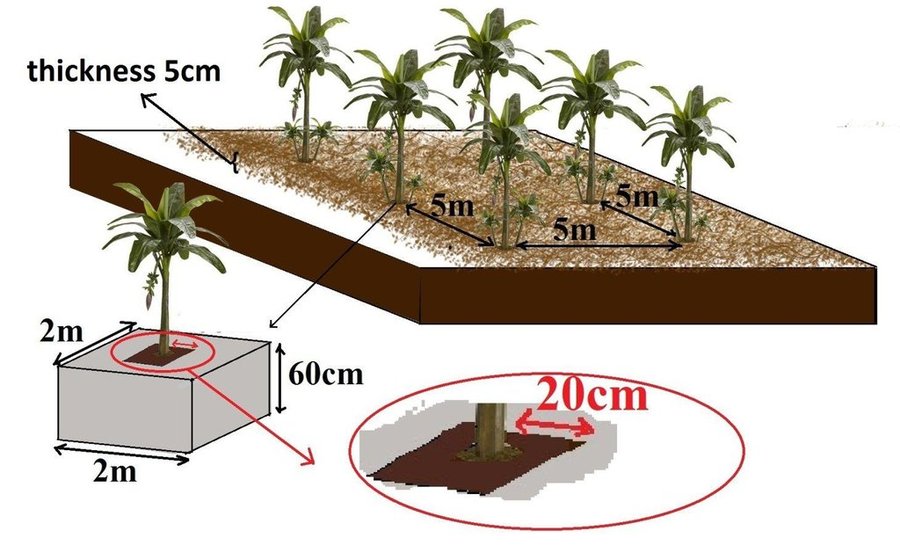
Author: Kagabo Desire and Ngenzi Guy, RAB, 5016 Kigali
ការបង្កើតនិងការថែទាំ៖ សកម្មភាព ធាតុចូល និងថ្លៃដើម
ការគណនាធាតុចូល និងថ្លៃដើម
- ថ្លៃដើមត្រូវបានគណនា៖
- រូបិយប័ណ្ណសម្រាប់ការគណនាថ្លៃដើម៖ ដុល្លារ
- អត្រាប្តូរប្រាក់ (ទៅជាដុល្លារអាមេរិក)៖ 1 USD = មិនមាន
- ថ្លៃឈ្នួលជាមធ្យមក្នុង ១ ថ្ងៃ៖ 1.70
កត្តាសំខាន់បំផុតដែលមានឥទ្ធិពលលើថ្លៃដើម
The labor affects most the cost of this technology. However, suckers or planting materials could increase the cost if not readily available at farm gate or in the neighborhood.
សកម្មភាពបង្កើតបច្ចេកទេស
-
Establishment of pits (ពេលវេលា/ ភាពញឹកញាប់: None)
-
Seedling plantation (ពេលវេលា/ ភាពញឹកញាប់: None)
-
Seedling transportation (ពេលវេលា/ ភាពញឹកញាប់: None)
ធាតុចូល និងថ្លៃដើមសម្រាប់ការបង្កើតបច្ចេកទេស
| បញ្ជាក់ពីធាតុចូល |
ឯកតា |
បរិមាណ |
ថ្លៃដើមក្នុងមួយឯកតា (ដុល្លារ) |
ថ្លៃធាតុចូលសរុប (ដុល្លារ) |
% នៃថ្លៃដើមដែលចំណាយដោយអ្នកប្រើប្រាស់ដី |
|
កម្លាំងពលកម្ម
|
| Land preparation, planting, thinning weeding |
persons/day/ha |
221,7647 |
1,7 |
377,0 |
100,0 |
|
សម្ភារៈ
|
| Tools |
ha |
1,0 |
30,0 |
30,0 |
100,0 |
|
សម្ភារៈដាំដុះ
|
| Acquisition of suckers |
ha |
1,0 |
937,5 |
937,5 |
100,0 |
|
ជី និងសារធាតុពុល
|
| Compost manure |
ha |
1,0 |
650,0 |
650,0 |
100,0 |
| ថ្លៃដើមសរុបក្នុងការបង្កើតបច្ចេកទេស |
1'994.5 |
|
| ថ្លៃដើមសរុបក្នុងការបង្កើតបច្ចេកទេសគិតជាដុល្លារ |
1'994.5 |
|
សកម្មភាពថែទាំ
-
Thinning banana field (ពេលវេលា/ ភាពញឹកញាប់: dry season)
-
Weeding (ពេលវេលា/ ភាពញឹកញាប់: rainy season)
-
Planting seedlings (ពេលវេលា/ ភាពញឹកញាប់: rainy season)
ធាតុចូលនិងថ្លៃដើមសម្រាប់ការថែទាំ
| បញ្ជាក់ពីធាតុចូល |
ឯកតា |
បរិមាណ |
ថ្លៃដើមក្នុងមួយឯកតា (ដុល្លារ) |
ថ្លៃធាតុចូលសរុប (ដុល្លារ) |
% នៃថ្លៃដើមដែលចំណាយដោយអ្នកប្រើប្រាស់ដី |
|
កម្លាំងពលកម្ម
|
| Labour |
ha |
1,0 |
42,0 |
42,0 |
100,0 |
| Thinning and weeding |
ha |
1,0 |
25,0 |
25,0 |
100,0 |
| ថ្លៃដើមសរុបសម្រាប់ការថែទាំដំណាំតាមបច្ចេកទេស |
67.0 |
|
| ថ្លៃដើមសរុបសម្រាប់ការថែទាំដំណាំតាមបច្ចេកទេសគិតជាដុល្លារ |
67.0 |
|
បរិស្ថានធម្មជាតិ
បរិមាណទឹកភ្លៀងជាមធ្យមប្រចាំឆ្នាំ
-
< 250 មម
-
251-500 មម
-
501-750 មម
-
751-1,000 មម
-
1,001-1,500 មម
-
1,501-2,000 មម
-
2,001-3,000 មម
-
3,001-4,000 មម
-
> 4,000 មម
តំបន់កសិអាកាសធាតុ
-
សើម
-
មានភ្លៀងមធ្យម
-
មានភ្លៀងតិចតួច
-
ស្ងួត
លក្ខណៈសម្គាល់នៃអាកាសធាតុ
Thermal climate class: tropics
ជម្រាល
-
រាបស្មើ (0-2%)
-
ជម្រាលតិចតួច (3-5%)
-
មធ្យម (6-10%)
-
ជម្រាលខ្ពស់បន្តិច (11-15%)
-
ទីទួល (16-30%)
-
ទីទួលចោត (31-60%)
-
ទីទួលចោតខ្លាំង (>60%)
ទម្រង់ដី
-
ខ្ពង់រាប
-
កំពូលភ្នំ
-
ជម្រាលភ្នំ
-
ជម្រាលទួល
-
ជម្រាលជើងភ្នំ
-
បាតជ្រលងភ្នំ
រយៈកម្ពស់ធៀបនឹងនីវ៉ូទឹកសមុទ្រ
-
0-100 ម
-
101-500 ម
-
501-1,000 ម
-
1,001-1,500 ម
-
1,501-2,000 ម
-
2,001-2,500 ម
-
2,501-3,000 ម
-
3,001-4,000 ម
-
> 4,000 ម
បច្ចេកទេសត្រូវបានអនុវត្តនៅក្នុង
-
សណ្ឋានដីប៉ោង
-
សណ្ឋានដីផត
-
មិនពាក់ព័ន្ធទាំងអស់
ជម្រៅដី
-
រាក់ខ្លាំង (0-20 សម)
-
រាក់ (21-50 សម)
-
មធ្យម (51-80 សម)
-
ជ្រៅ (81-120 សម)
-
ជ្រៅខ្លាំង (> 120 សម)
វាយនៈភាពដី (ដីស្រទាប់ខាងលើ)
-
គ្រើម/ មានពន្លឺ (ខ្សាច់)
-
មធ្យម (ល្បាយ, ល្បាប់)
-
ម៉ត់/ ធ្ងន់ (ឥដ្ឋ)
វាយនភាពដី (> 20 សម ក្រោមស្រទាប់លើ)
-
គ្រើម/ មានពន្លឺ (ខ្សាច់)
-
មធ្យម (ល្បាយ, ល្បាប់)
-
ម៉ត់/ ធ្ងន់ (ឥដ្ឋ)
កម្រិតសារធាតុសរីរាង្គក្នុងដីស្រទាប់លើ
-
ខ្ពស់ (>3%)
-
មធ្យម (1-3%)
-
ទាប (<1%)
ដង្ហើមទឹកក្នុងដី
-
ផ្ទៃខាងលើ
-
< 5 ម
-
5-50 ម
-
> 50 ម
ភាពអាចរកបាននៃទឹកលើដី
-
លើស
-
ល្អ
-
កម្រិតមធ្យម
-
មិនមាន/ គ្មាន
គុណភាពទឹក (មិនបានធ្វើប្រព្រឹត្តិកម្ម)
-
ទឹកពិសារដែលមានគុណភាពល្អ
-
ទឹកពិសារដែលគ្មានគុណភាព (តម្រូវឱ្យមានការសំអាត)
-
ទឹកសម្រាប់តែការធ្វើកសិកម្ម (ស្រោចស្រព)
-
ទឹកមិនអាចប្រើប្រាស់បាន
គុណភាពទឹក គឺផ្តោតទៅលើ៖
តើមានបញ្ហាទឹកប្រៃហូរចូលដែរឬទេ?
ការកើតឡើងនៃទឹកជំនន់
ភាពសំបូរបែបនៃជម្រកធម្មជាតិ
ចរិតលក្ខណៈរបស់អ្នកប្រើប្រាស់ដីដែលប្រើបច្ចេកទេស SLM
ទីផ្សារ
-
សម្រាប់ហូបក្នុងគ្រួសារ (ផ្គត់ផ្គង់ខ្លួនឯង)
-
ពាក់កណ្តាលពាណិជ្ជកម្ម (ផ្គត់ផ្គង់ខ្លួនឯង/ ពាណិជ្ជកម្ម)
-
ពាណិជ្ជកម្ម/ ទីផ្សារ
ចំណូលក្រៅកសិដ្ឋាន
-
តិចជាង 10% នៃចំណូល
-
10-50% នៃចំណូល
-
ច្រើនជាង 50% នៃចំណូល
កម្រិតជីវភាព
-
មិនល្អខ្លាំង
-
មិនល្អ
-
មធ្យម
-
មាន
-
មានខ្លាំង
កម្រិតនៃការប្រើគ្រឿងយន្ត
-
ប្រើកម្លាំងពលកម្ម
-
ប្រើកម្លាំងសត្វ
-
គ្រឿងយន្ត/ ម៉ាស៊ីន
នៅមួយកន្លែង ឬពនេចរ
-
នៅមួយកន្លែង
-
ពាក់កណ្តាលពនេចរ
-
ពនេចរ
បុគ្គល ឬក្រុម
-
ធ្វើខ្លួនឯង/ គ្រួសារ
-
ជាក្រុម/ សហគមន៍
-
សហករ
-
មានបុគ្គលិក (ក្រុមហ៊ុន, រដ្ឋ)
អាយុ
-
កុមារ
-
យុវវ័យ
-
វ័យកណ្តាល
-
មនុស្សចាស់
ផ្ទៃដីប្រើប្រាស់ក្នុងមួយគ្រួសារ
-
< 0.5 ហិកតា
-
0.5-1 ហិកតា
-
1-2 ហិកតា
-
2-5 ហិកតា
-
5-15 ហិកតា
-
15-50 ហិកតា
-
50-100 ហិកតា
-
100-500 ហិកតា
-
500-1,000 ហិកតា
-
1,000-10,000 ហិកតា
-
> 10,000 ហិកតា
មាត្រដ្ឋាន
-
ខ្នាតតូច
-
ខ្នាតមធ្យម
-
ខ្នាតធំ
ភាពជាម្ចាស់ដីធ្លី
-
រដ្ឋ
-
ក្រុមហ៊ុន
-
ភូមិ
-
ក្រុម
-
ឯកជន មិនមានកម្មសិទ្ធ
-
ឯកជន មានកម្មសិទ្ធ
សិទ្ធិប្រើប្រាស់ដី
-
អាស្រ័យផលសេរី (មិនមានការកំណត់)
-
ជាក្រុម (មានដែនកំណត់)
-
កិច្ចសន្យាជួល
-
ឯកជន
សិទ្ធិប្រើប្រាស់ទឹក
-
អាស្រ័យផលសេរី (មិនមានការកំណត់)
-
ជាក្រុម (មានដែនកំណត់)
-
កិច្ចសន្យាជួល
-
ឯកជន
ប្រើប្រាស់សេវាកម្ម និងហេដ្ឋារចនាសម្ព័ន្ធ
ការងារ (ឧ. ការងារក្រៅកសិដ្ឋាន)
ផលប៉ះពាល់
ផលប៉ះពាល់សេដ្ឋកិច្ចសង្គម
ផលិតកម្មដំណាំ
គុណភាពមុន SLM: 50 tons
គុណភាពក្រោយ SLM: 190 tons
Because of the new technology the yield is 4 fold
ហានិភ័យនៃភាពបរាជ័យរបស់ផលិតកម្ម
ចំណូលក្នុងកសិដ្ឋាន
គុណភាពមុន SLM: 1233
គុណភាពក្រោយ SLM: 4687
The net family income has improved by 4 fold
ផលប៉ះពាល់វប្បធម៌សង្គម
សន្តិសុខស្បៀង/ ភាពគ្រប់គ្រាន់ខ្លួនឯង
គុណភាពមុន SLM: 125
គុណភាពក្រោយ SLM: 258
ស្ថានភាពសុខភាព
អាក្រក់ជាងមុន
ប្រសើរជាងមុន
គុណភាពមុន SLM: 70%
គុណភាពក្រោយ SLM: 90%
livelihood and human well-being
The technology increases banana production and the net farm income
ផលប៉ះពាល់ក្នុងបរិវេណ
ទឹកក្រោមដី/ ការបំពុលទឹកទន្លេ
ការវិភាគថ្លៃដើម និងអត្ថប្រយោជន៍
អត្ថប្រយោជន៍បើប្រៀបធៀបនឹងថ្លៃដើមក្នុងការបង្កើតបច្ចេកទេស
រយៈពេលខ្លី
អវិជ្ជមានខ្លាំង
វិជ្ជមានខ្លាំង
រយៈពេលវែង
អវិជ្ជមានខ្លាំង
វិជ្ជមានខ្លាំង
អត្ថប្រយោជន៍បើប្រៀបធៀបនឹងថ្លៃដើមក្នុងការថែទាំបច្ចេកទេស
រយៈពេលខ្លី
អវិជ្ជមានខ្លាំង
វិជ្ជមានខ្លាំង
រយៈពេលវែង
អវិជ្ជមានខ្លាំង
វិជ្ជមានខ្លាំង
ការប្រែប្រួលអាកាសធាតុ
គ្រោះអាកាសធាតុ (មហន្តរាយ)
ការទទួលយក និងការបន្ស៊ាំ
ភាគរយនៃអ្នកប្រើប្រាស់ដីនៅតំបន់ដែលបានទទួលយកបច្ចេកទេស
-
តែមួយករណី /ពិសោធន៍
-
1-10%
-
11-50%
-
> 50%
ក្នុងចំណោមអ្នកទទួលយកបច្ចេកទេសនេះ តើមានប៉ុន្មានភាគរយដែលបានអនុវត្តន៍ដោយមិនបានទទួលការលើកទឹកចិត្តជាសម្ភារៈ?
-
0-10%
-
11-50%
-
51-90%
-
91-100%
ចំនួនខ្នងផ្ទះ និង/ឬតំបន់ដែលគ្របដណ្តប់
43000 housheolds covering 80 percent of stated area
តើថ្មីៗនេះ បច្ចេកទេសនេះត្រូវបានកែតម្រូវដើម្បីបន្ស៊ាំទៅនឹងស្ថានភាពប្រែប្រួលដែរឬទេ?
ចំពោះលក្ខខណ្ឌប្រែប្រួលណាមួយដែលត្រូវបានបន្ស៊ាំ?
-
ការប្រែប្រួលអាកាសធាតុ/គ្រោះមហន្តរាយធម្មជាតិ
-
បម្រែបម្រួលទីផ្សារ
-
កម្លាំងពលកម្មដែលអាចរកបាន (ចំណាកស្រុក)
សេក្តីសន្និដ្ឋាន និងមេរៀនបទពិសោធន៍
ភាពខ្លាំង: ទស្សនៈអ្នកប្រើប្រាស់ដី
-
Increase production
How can they be sustained / enhanced? Regular maintenance
-
Reduce surface runoff by enhancing the retention soil moisture
How can they be sustained / enhanced? Regular maintenance
ភាពខ្លាំង: ទស្សនៈរបស់អ្នកចងក្រង ឬបុគ្គលសំខាន់ផ្សេងទៀត
-
Increased food security and income of land users
How can they be sustained / enhanced? Scaling up the technology
-
Increased water holding capacity
How can they be sustained / enhanced? Good maintenance by regularly replacing mulch
-
Increased soil moisture
How can they be sustained / enhanced? Good maintenance by adding very often organic manure
ចំណុចខ្សោយ/ គុណវិបត្តិ/ ហានិភ័យ : ទស្សនៈអ្នកប្រើប្រាស់ដីវិធីដោះស្រាយ
ចំណុចខ្សោយ/ គុណវិបត្តិ/ ហានិភ័យ : ទស្សនៈរបស់អ្នកចងក្រង ឬបុគ្គលសំខាន់ផ្សេងទៀតវិធីដោះស្រាយ
-
This technology maybe expensive at establishment phase, maybe not affordable by every smallholder farmer
Allow farmers to access credits through farmer saving schemes or cooperatives
ឯកសារយោង
អ្នកត្រួតពិនិត្យ
-
David Streiff
-
Alexandra Gavilano
កាលបរិច្ឆេទនៃការអនុវត្ត: 24 ខែ ធ្នូ ឆ្នាំ 2012
កែតម្រូវចុងក្រោយ: 17 ខែ មិថុនា ឆ្នាំ 2019
បុគ្គលសំខាន់ៗ
-
Desire Kagabo - អ្នកជំនាញឯកទេស SLM
-
Guy Ngenzi - អ្នកជំនាញឯកទេស SLM
-
Iwona Piechowiak - អ្នកជំនាញឯកទេស SLM
ការពណ៌នាលម្អិតក្នុងប្រព័ន្ធគ្រប់គ្រងទិន្នន័យរបស់វ៉ូខេត
ឯកសារនេះត្រូវបានសម្របសម្រួលដោយ
ស្ថាប័ន៖
- Food and Agriculture Organization of the United Nations (FAO) - ប្រទេសអ៊ីតាលី
- Rwanda Agriculture Board (Rwanda Agriculture Board) - ប្រទេសរវ៉ាន់ដា
គម្រោង
- The Transboundary Agro-ecosystem Management Project for the Kagera River Basin (GEF-FAO / Kagera TAMP )
